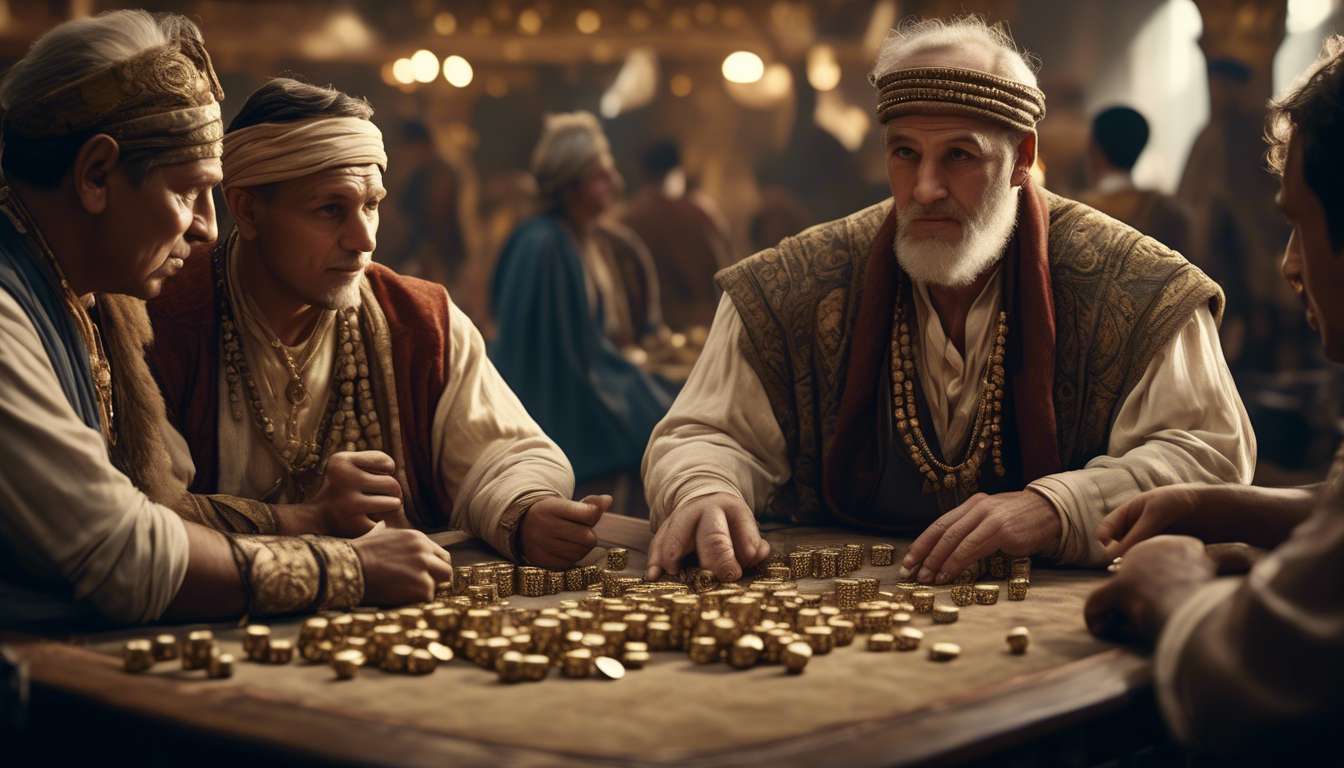We’ve always been fascinated by the thrill of the game, not just as spectators but as active participants in the unfolding drama. As we delve into the history of sports betting, we find ourselves retracing the steps of our ancestors who shared this same excitement.
Historical Roots:
- From the ancient Greeks, who wagered on Olympic events
- To the Romans placing bets on chariot races
The roots of sports betting run deep in our collective past.
Evolution of Sports Betting:
Over time, this practice has evolved, shaped by cultural shifts and technological advancements. Today, we stand at the intersection of tradition and innovation, where betting has become a global phenomenon, accessible to anyone with a smartphone.
Exploration Objective:
In our exploration, we aim to uncover the origins of this age-old tradition, understanding how it transformed from informal wagers to the sophisticated industry we know today.
Join us as we journey through time, tracing the evolution of sports betting.
Ancient Greek Wagering on Olympics
The ancient Greeks began the tradition of betting on athletic competitions during the Olympics, turning sporting events into lively spectacles of chance and skill. Betting wasn’t just about winning or losing; it was a shared experience that brought people together, fostering a sense of community and belonging. We can imagine ourselves among the enthusiastic crowds, united in our love for the games and the thrill of wagering.
As we participated in wagering, we also contributed to the globalization of betting practices. The Olympics were a melting pot of cultures, with athletes and spectators from across the Hellenic world. This diverse gathering allowed the concept of betting to spread beyond Greece, laying the groundwork for its growth into the global phenomenon we recognize today.
By joining in the excitement, we were part of a tradition that transcended borders and time, connecting us to others who shared our passion for competition and chance. In this way, ancient Greek betting practices sowed the seeds for the worldwide integration of sports and wagering.
Roman Bets on Chariot Races
In ancient Rome, we eagerly gathered in grand arenas to place bets on the thrilling chariot races, captivated by the speed and skill of the daring charioteers. These races weren’t just a spectacle; they were a social event that united us in shared excitement and anticipation. From the roaring cheers to the collective gasps, every moment was amplified by our communal spirit.
Wagering on these races wasn’t just about the thrill of winning; it was a way to connect with one another, sharing in the highs and lows of each race. Betting became an expression of loyalty, supporting our favored teams and charioteers. As we exchanged coins and discussed odds, we became part of a larger community bound by the love of the sport.
Chariot racing and betting planted seeds of globalization, as people from different corners of the Roman Empire came together, blending cultures and traditions. This shared passion transcended boundaries, reminding us of our shared humanity.
Early Asian Betting Traditions
In ancient Asia, betting found its roots in games of chance and skill that were integral to various cultures and societies. It was embraced as a form of entertainment and social connection.
Whether through:
- Dice games in China
- Animal fights across Southeast Asia
Betting wasn’t just about the thrill of a win; it was about community and tradition. Each wager brought people closer together, strengthening the bonds within societies.
As we examine these early betting traditions, it’s clear they laid the groundwork for a global phenomenon. The exchange of ideas and practices through trade and exploration allowed these ancient Asian customs to influence other cultures.
This early form of globalization of gambling practices was pivotal in shaping the diverse betting landscapes we see today. We are part of a rich tapestry that ties communities across the world, connecting us through shared interests and timeless traditions.
Medieval European Wagering Practices
Throughout medieval Europe, wagering reflected the era’s blend of tradition, superstition, and emerging social structures. As communities gathered for festivals, markets, and tournaments, betting became a shared activity that united individuals across different social strata.
We can imagine the excitement as a javelin throw or a horse race unfolded, with wagers placed and the outcomes eagerly anticipated.
In these gatherings, betting wasn’t just about money; it was about:
- Honor
- Reputation
- Community standing
The thrill of wagering on games and contests allowed people to bond over shared experiences and the unpredictability of chance.
This period laid significant groundwork for the globalization of betting practices. Gradually, as trade routes expanded, so did the spread of European betting traditions to other parts of the world.
We embraced betting as a social norm, woven into the fabric of medieval life. The camaraderie it fostered created a sense of belonging that transcended borders and continues to influence our global culture today.
Colonial America’s Wagering Culture
In Colonial America, gambling quickly became a popular pastime that reflected the diverse cultural influences of settlers. As communities formed, wagering on horse races and card games became a way for people to connect and share experiences.
Betting wasn’t just about the thrill of winning; it was an integral part of the social fabric, bringing people together in a new and unfamiliar land. Settlers found common ground in the excitement of placing bets, a practice that echoed the traditions of their European ancestors, yet adapted to the new world.
The early betting culture was shaped by the unique blend of traditions brought by settlers from across the globe. This early form of globalization introduced a variety of games and betting methods, allowing them to embrace a shared sense of community and camaraderie.
Together, they created a vibrant culture where wagering wasn’t merely a pastime. It became a cornerstone of their collective identity, fostering a sense of belonging and unity.
Industrial Revolution’s Impact on Betting
During the Industrial Revolution, betting practices underwent a dramatic transformation due to technological advancements and urbanization. These changes expanded opportunities for organized gambling.
As communities grew and became more connected, wagering evolved into a communal activity, bringing people together in a shared thrill.
The introduction of the telegraph was a significant milestone. It enabled swift communication, allowing betting information to spread quickly and creating a sense of belonging among enthusiasts across vast distances.
Steam-powered transportation played a vital role by bringing people closer together. It made it easier to gather at horse races and other sporting events, fueling a flourishing betting culture characterized by camaraderie and excitement.
The industrial age not only revolutionized work and living conditions but also transformed how we engaged in betting, setting the stage for its global appeal.
Globalization further enhanced betting practices by introducing diverse ideas and practices from across borders. This exchange enriched experiences and fostered a sense of unity, making wagering a truly global phenomenon.
Modernization of Sports Betting
In recent decades, technological advancements have revolutionized sports betting, making it more accessible and engaging for enthusiasts worldwide. As we’ve embraced the digital age, our community has witnessed a transformation in how we approach wagering.
Online platforms now offer us the convenience to place bets from anywhere, anytime. This fosters a sense of belonging among global fans who share our passion.
With the click of a button, we’re able to explore a variety of sports and betting options previously unimaginable. This modernization has not only expanded our opportunities but also enhanced the thrill of the game.
Live betting allows us to engage with events in real-time, creating a more immersive experience that draws us closer together.
Moreover, the integration of data analytics and predictive technologies elevates our wagering strategies, making us feel more connected and informed.
As sports betting continues to evolve, we’re at the forefront of a dynamic, inclusive community that thrives on innovation and shared excitement.
Globalization of Wagering Industry
Across continents, we’ve witnessed the wagering industry expand its reach, connecting diverse cultures and creating a truly global community. This globalization has transformed betting from a local pastime into a worldwide phenomenon.
As we gather around our screens, placing bets on matches happening thousands of miles away, we’re united in excitement and anticipation. This shared experience fosters a sense of belonging among us, transcending borders and languages.
The digital age has been a catalyst in this transformation, making it easier than ever for us to access betting platforms and engage with others across the globe. With the click of a button, we can participate in international wagering events, feeling the thrill alongside fellow enthusiasts from different corners of the world.
As regulations have adapted, they’ve ensured a safer, more inclusive environment for all of us. This interconnectedness brings us together, reinforcing our shared passion and allowing us to be part of a vibrant global wagering community.
Conclusion
You’ve now journeyed through the rich history of sports betting, from the ancient Greeks wagering on the Olympics to the modern global industry it has become.
The evolution of betting practices across different civilizations and time periods highlights the enduring appeal of predicting sports outcomes.
As sports betting continues to evolve with advancements in technology and globalization, its roots remain deeply intertwined with the human fascination for competition and chance.

